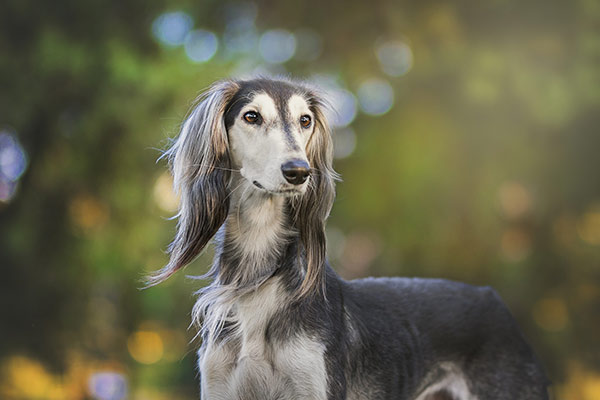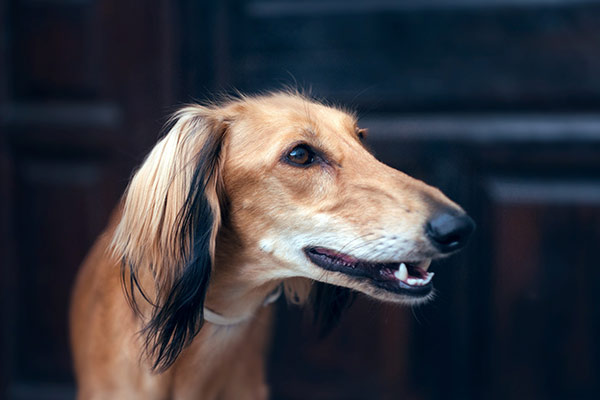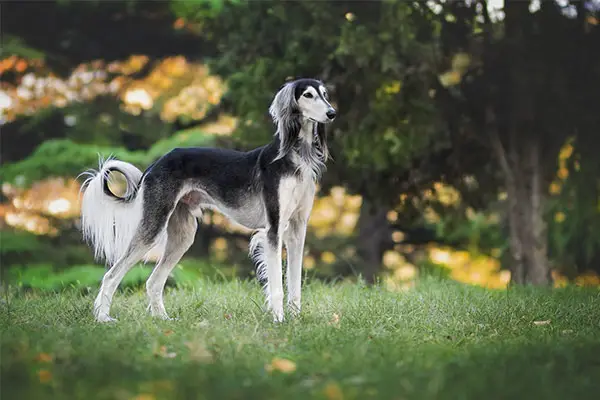Standing at the height of 28 inches, Salukis are mostly built for speed and endurance. These are beautiful, medium-sized dogs known to be in existence for a thousand years. The Saluki features long, slender legs, a narrow body, a deep chest, a small waist, and a long tail – a perfectly balanced beauty.
These calm dogs are adaptable in any living conditions and climates. And though their beauty is unlike any other, they are not the type of dog for everyone. Salukis require devotion, time, and attention, so taking care of them can be challenging for those who are inexperienced.

Saluki Breed Statistics
| Dog Breed Group | Hound |
| Breed Size | Medium |
| Height | 23-28 inches (male); considerably smaller (female) |
| Weight | 40-65 pounds |
| Lifespan | 10-17 years |
Saluki Breed Ratings
| Energy level | |
| Exercise needs | |
| Requires attention | |
| Playfulness | |
| Trainability | |
| Shedding | |
| Grooming | |
| Friendly with family | |
| Friendly with kids | |
| Friendly with strangers | |
| Friendly with other dogs | |
| Prey Drive |
Saluki History
The Saluki dog is considered one of the most ancient dog breeds who have descended from the world’s first dogs. Their origin can be traced back to ancient Egypt, as depicted on Egyptian tombs around 2100 BCE. There were even older carvings where Saluki dogs were shown, and these were around 7000-6000 BCE.
The dogs are prized for their hunting abilities. They often accompany Pharaohs to hunt gazelles and hares that earned them their original names, Persian Greyhounds or Gazelle Hounds.
For the old Egyptian culture, dogs are considered unclean. However, as these dogs were treasured, they’re the only ones allowed to go inside the Bedouin tents. Egyptians even dubbed these dogs as “El Hor” or the noble one, which likely fits their beauty and grace.
By the early 1900s, Salukis arrived in Britain. However, it was only after World War I when the dogs became an established breed. By 1927, the breed was also recognized in America.
Today, the dogs rank 120th as the most popular dog breed in the US. They are still considered a rare treasure, with only very few families owning one.
Saluki Temperament
Salukis are often described as gentle, dignified, and independent-minded dogs. These dogs can be destructive and hyperactive during the puppy stage, but as adults, they are usually calm and quiet indoors.
These dogs love the comfort of home, and they surely enjoy lying down their soft beds or sofas. However, once outside, they can run pretty fast, so make sure you have secured and high fences in your backyard.
Salukis are generally aloof to people, particularly to strangers. But know that they are affectionate and devoted dogs to family. There are times when they’d only prefer to bond with a single person and will experience separation anxiety when left alone for long periods.
Although sociable with other dogs and pets in the house, Salukis tend to chase smaller animals. They are also gentle with children, but supervision is still essential.
Socialization is essential to Salukis if you want them to become more well-rounded. Training is also vital and should be handled calmly with lots of food and games.

Saluki Care Requirements
- Nutrition: Salukis don’t have special dietary requirements as long as you give them a high-quality and well-balanced meal. This should consist of essential nutrients like proteins, fats, carbohydrates, vitamins, and minerals. You should only buy high-quality ingredients for the meal you prepare. Animal meat, fish oils, whole grains, fruits, and vegetables are excellent sources of these nutrients. You can ask your vet for advice too, and make sure to stay away to ingredients your dog may be allergic to.
- Grooming: Salukis come in two coact types, which are both easily maintained through weekly brushing. Make sure to pay attention to the long hairs in their ears and tails when brushing to prevent mats and tangles. Bathing can also be done occasionally, or only when needed. These dogs are known to be very clean, so there’s no doggy odor that you need to worry about. However, regularly clean their ears to prevent ear infection. Keep the nails short with regular trimming. Long nails can cause pain and discomfort, and you wouldn’t want that to your dogs.
- Exercise: As Salukis are energetic dogs, they require regular but moderate amounts of exercise to remain healthy. Daily walks should suffice for these dogs, but letting them run around a fenced yard will make them happy. If you want to put them off-leash, be sure to keep close supervision as these dogs are also great escape-artists. They can jump high up and can run very fast, so always keep a close watch.
- Health: Salukis are generally healthy dogs. There are no major health problems that you should worry about, mainly because it has not been crossed with other breeds for years. However, there are some genetically inherited diseases you need to have checked like: Anesthesia Sensitivity. Hemangiosarcoma, Cardiomyopathy, and Hypothyroidism. We recommend that you meet at least one of your dog’s parents to be aware of any health issues that your dog may inherit. You can also take him to do some screening tests to detect diseases at an early stage.
- Lifespan: The life expectancy of Salukis is 10-17 years.
Famous Salukis
- Jinniyat: The first Salukis registered by the American Kennel Club
Fun Facts about Salukis
- The Saluki is one of the ancient dog breeds that existed for thousands of years.
- They are believed to have originated from ancient Egypt.
- They are considered royal dogs of Egypt.
- They are highly valued and were called “El Hor,” which means noble.
- These dogs used to accompany Pharaohs in hunting gazelles.
- They are fast runners with a speed of 30-35 mph.
- Saluki is the sports mascot for Southern Illinois University.
- The American Kennel Club recognized them in 1927.
Check Out Other Hound Dog Breeds:
Afghan Hound, American English Coonhounds, American Foxhound, Basenjis, Basset Hound, Beagle, Black and Tan Coonhound, Bloodhound, Bluetick Coonhound, Borzois, Cirnechi dell’Etna, Dachshund, English Foxhound, Grand Basset Griffon Vendeens, Greyhound, Harrier, Ibizan Hound, Icelandic Sheepdogs, Irish Wolfhound, Norwegian Elkhound, Otterhound, Petit Basset Griffon Vendéen, Pharaoh Hounds, Plotts, Portuguese Podengo, Redbone Coonhound, Rhodesian Ridgeback, Scottish Deerhounds, Sloughis, Treeing Walker Coonhound, Whippet

